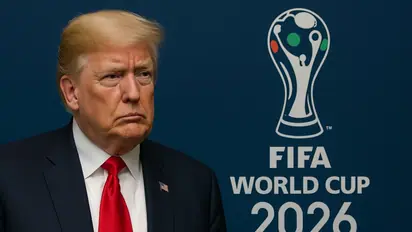Will Trump's tariffs crash FIFA's $15 bn 2026 World Cup dream?

Synopsis
Experts believe the 2026 FIFA World Cup will remain unaffected by Trump’s trade wars, though some football club owners may exploit economic uncertainty for financial gain.
As the world prepares for the 2026 FIFA World Cup across the United States, Canada, and Mexico, questions are surfacing about whether Donald Trump’s aggressive economic policies could throw a wrench into global football’s biggest spectacle. Trump’s “liberation day” rhetoric and escalating trade wars have rattled global markets and undermined trust in the United States as a stable superpower. But while the political gamble may create ripple effects in certain industries, elite sport — and particularly football — appears largely immune to the shockwaves.
Also read: India's chance to rewire industrial reforms amidst tariff turbulence | Opinion
FIFA's high-stakes bet on the US
FIFA’s decision to award the 2026 tournament to North America, particularly with Trump’s backing during his first term, was primarily driven by financial promises rather than sporting ideals. Trump had reportedly assured FIFA of a $15 billion revenue windfall — a number that swayed votes and sealed the deal.
Experts believe it wasn't about Trump's care and concern for football. Rather, FIFA and Gianni Infantino wanted to dance with Trump because of the money.
If economic instability disrupts those projections, it may be FIFA — not the fans or the sport — that takes the hit. FIFA were willing to take that gamble, and now they have to live with the consequences, believe experts.
Global sports rights shielded from tariffs
Despite fears of rising tariffs and trade barriers, core aspects of World Cup revenue are unlikely to be affected. Television rights, for example, are classified as services rather than goods and operate in a global marketplace, far beyond the reach of US-specific economic moves.
TV rights won’t be impacted the way manufacturing or product-based industries are, claim analysts. The World Cup has a global audience, and so does its commercial appeal.
Currency fluctuations and billionaire club owners
Some have speculated that the volatility in currency exchange and rising borrowing rates could impact American football club owners like the Glazers of Manchester United. But analysts argue that such concerns are minor for ultra-wealthy owners with diversified global portfolios.
Analysts believe football's billionaire club owners are not worried about fluctuations. They further note that they could use these moments to buy low and profit later. We saw it during Covid — markets created opportunities, not threats, for those with serious wealth.
Will clubs use global chaos as an excuse?
What could be more worrying for fans is the way some club owners may exploit this instability. The Glazers, in particular, have been accused of using external circumstances to justify internal policies — from price hikes to reduced investments.
Don’t be surprised if we hear more about how Manchester United are out of cash. It’s a narrative that conveniently fits the moment.
Premier League resilience in crisis
Historically, football has proven remarkably resilient in times of crisis. Even during Covid-19, when commerce came to a halt globally, the Premier League continued — with some clubs complaining about finances, but the core structure remained intact.
There’s never really been a ‘shutdown’ in football. The super-wealthy get wealthier during crises, and Premier League club owners fall right into that category.
A tournament unlikely to be derailed
With the 2026 FIFA World Cup just months away, most experts agree the tournament will go ahead as planned — and be a commercial success. Trump’s policies may spark short-term disruption, but the long-term vision of a successful World Cup remains intact.
Trump’s tariff regime is probably more posturing than permanent policy, believe experts. By the time the tournament kicks off, solutions will have been found, and the global appetite for football will do the rest.
Stay on top of all the latest Sports News, including Cricket News, Football News, WWE News, and updates from Other Sports around the world. Get live scores, match highlights, player stats, and expert analysis of every major tournament. Download the Asianet News Official App from the Android Play Store and iPhone App Store to never miss a sporting moment and stay connected to the action anytime, anywhere.